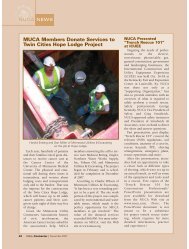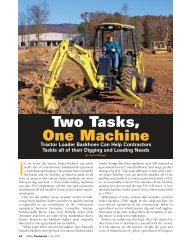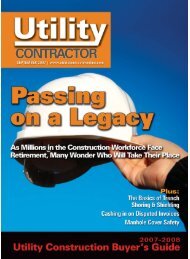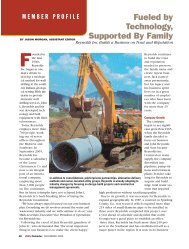INSIDE WASHINGTON“Buy American” — An Old Idea,But Is It a Good One?By PJ TabitOn February 17, with the American economy seeminglyin free fall, President Barack Obama signed intolaw the American Recovery and Reinvestment Act(ARRA), an economic stimulus package worth $787billion. Buried on page 189 is a short paragraph labeled Section1605 — “Buy American.” Short though it may be, it is shapingup to be one of the most controversial provisions in the bill.In principle, the justification for the “Buy American” provisionis easy to understand. As the federal government outlayshundreds of billions of dollars to help stimulate the Americaneconomy, it would appear to be counterproductive to allow thosefunds to be used to buy goods manufactured in other countries.The controversy arises, however, when one considers not onlythe complications involved in actually implementing Section1605, but also threats of a global trade war from countries anticipatinga negative impact on their economies as a result of a “BuyAmerican” policy.The concept of “buying American” is not a new one. Lawspassed as early as 1875 gave “preferential treatment” to American-madegoods — a sentiment manifested in the Buy AmericanAct of 1933, which required that, with some exceptions, anymanufactured or unmanufactured good used for public use musthave originated in the United States. Since then, free trade agreementslike the General Agreement on Tariff and Trade (GATT)and the U.S.-Canada Free Trade Agreement have reduced thescope of the 1933 law and liberalized global trade.Similar to the 1933 bill, the ARRA “Buy American” provision(Sec. 1605) stipulates the following: “None of the funds appropriatedor otherwise made available by this Act may be used for aproject or the construction, alteration, maintenance or repair ofa public building or public work unless all of the iron, steel andmanufactured goods used in the project are produced in the UnitedStates.” Like the 1933 bill, the language also allows for somediscretion in applying the provision. The head of the federal departmentor agency involved can waive the provision if applyingthe provision would not be in the public interest, the materials inquestion aren’t produced in the United States in reasonably availableor sufficient quantities and/or applying the provision wouldincrease the cost of the overall project by more than 25 percent.30 <strong>Utility</strong> <strong>Contractor</strong> | <strong>July</strong> 2009Although the provision itself appears to be straightforward, thediscretion granted to each federal agency to issue its own guidanceon how the law will be applied muddies the waters considerably,thereby making it more difficult for contractors to comply. A quicklook at three federal agencies illustrates the point.Application, Agency by AgencyAs of May 22, the Environmental Protection Agency (EPA)waived the “Buy American” clause for de minimis items, defined as“components [that] comprise no more than 5 percent of the totalcost of the materials used in and incorporated into a project.”<strong>Issue</strong>d after meeting with several industry groups, the waiverapplies to any EPA projects funded with ARRA money, includingprojects funded through the Clean Water State RevolvingFund and the Drinking Water State Revolving Fund. This decisionfrees contractors from the impossible task of having tomonitor the country of origin for the thousands of incidentalmanufactured goods used in a typical project. Other federalagencies have not been as quick to act.The Federal Highway Administration (FHWA), for example,has the distinction of maintaining the most restrictive and mostcomplicated “Buy American” policies. The FHWA stipulatesthat all iron, steel and manufactured products must be completelyproduced in the U.S., from “initial melting and mixing”to coating, and, unlike other agencies, the FHWA does notgrant waivers if buying domestic products severely delays orincreases the cost of the project. It is difficult to see how thesepolicies support the two fundamental purposes of the stimuluspackage — namely, efficient use of taxpayer money to improvethe nation’s infrastructure and expedient spending to stimulatethe economy quickly.Finally, the Rural <strong>Utility</strong> Service (RUS) has yet to issue any firmguidelines for the provision, preferring to approve products ona case-by-case basis. As might be expected, gaining certificationcan be a time-consuming and therefore costly process.ProponentsDespite its problems, “Buy American” has its merits and supporters.The basic idea is that if American taxpayers are financ-
INSIDE WASHINGTONing the $787 billion stimulus, they should be the ones reapingthe benefits. According to a recent survey, this sentiment isshared by 86 percent of the population. Proponents also arguethat such protection for American manufacturers is necessaryto counter similar protections provided to their Europeancounterparts. Economist Robert Scott, for example, notes thatanother foreign competitor, China, spent more than $15 billionon energy subsidies in 2007. “When domestic industrieshave been injured by unfair trade practices, protecting themis good policy,” says Scott. Put simply, free trade must be accompaniedby fair trade; otherwise domestic companies willcontinue to outsource labor, while the American worker endsup footing the bill.OpponentsAlthough the “Buy American” provision was intended tomaximize the amount of stimulus money that would supportAmerican businesses and workers, thousands of U.S.firms have already been negatively impacted. A June 2009New York Times article noted that a Pennsylvania company,Duferco Farrel, was forced to cut 600 jobs in that statebecause some of its products are partially manufacturedin Canada, and as a result, it could not supply any of theARRA-funded projects. This result is, unfortunately, beingrepeated nationwide.The cost of the “Buy American” provisioncan also be reckoned in termsof the time and resources contractorsmust expend either deciphering agency-by-agencyguidance on the termsof the provision to determine if theyare in compliance or operating in thevacuum of no guidance at all. On June10, the executive director of the TexasRural Water Association testified beforea House committee hearing that “sometype of guidance from the Department[of Agriculture] is desperately needed.”In either situation, projects are delayedor abandoned, preventing the stimuluspackage from being fully effective.A Historical PerspectiveAs the economy soured in the fall of 2008,politicians on Capitol Hill and pundits atnews desks across the nation could not helpbut compare this financial meltdown to themost infamous of financial meltdowns, theGreat Depression. The 1930s economic collapseinspired a wave of economic nationalism,giving rise to the Smoot-Hawley Tariff,which in 1930 increased tariffs to unprecedentedlevels. Similar tariffs from Americantrading partners soon followed. Subsequently,by 1932 American exports had fallen to$390 million from a high of $1.3 billion in 1929; global tradefell by 66 percent.Although the economic situations are not perfectly analogous,the growing international criticism of the “Buy American”provision of ARRA should serve as a reminder of the negativeeffects of 1930s protectionism. Canada, the United States’ largesttrading partner, has already passed legislation (June 5) that“limit[s] government procurement from abroad to countriesthat themselves do not bar Canadian companies from suchcompetition.” The European Union and the United Kingdomhave threatened similar policies. It is this aspect of the “BuyAmerican” controversy that is perhaps the most disturbing.If a new wave of protectionist global trade takes hold, the effectcould cost American businesses billions in lost trade.While discordant voices continue to debate the pros andcons of “Buy American,” a definitive solution remains elusive.Until one is found, NUCA will make every effort to supportits members with as many resources as it can to help themnavigate the uncharted waters surrounding the provision’simplementation on utility construction projects.PJ Tabit is a NUCA Government Relations Intern and a senior at theUniversity of Scranton in Scranton, Pa., double-majoring in PoliticalScience and Philosophy.<strong>July</strong> 2009 | <strong>Utility</strong> <strong>Contractor</strong> 31National <strong>Utility</strong> <strong>Contractor</strong>s Association
















